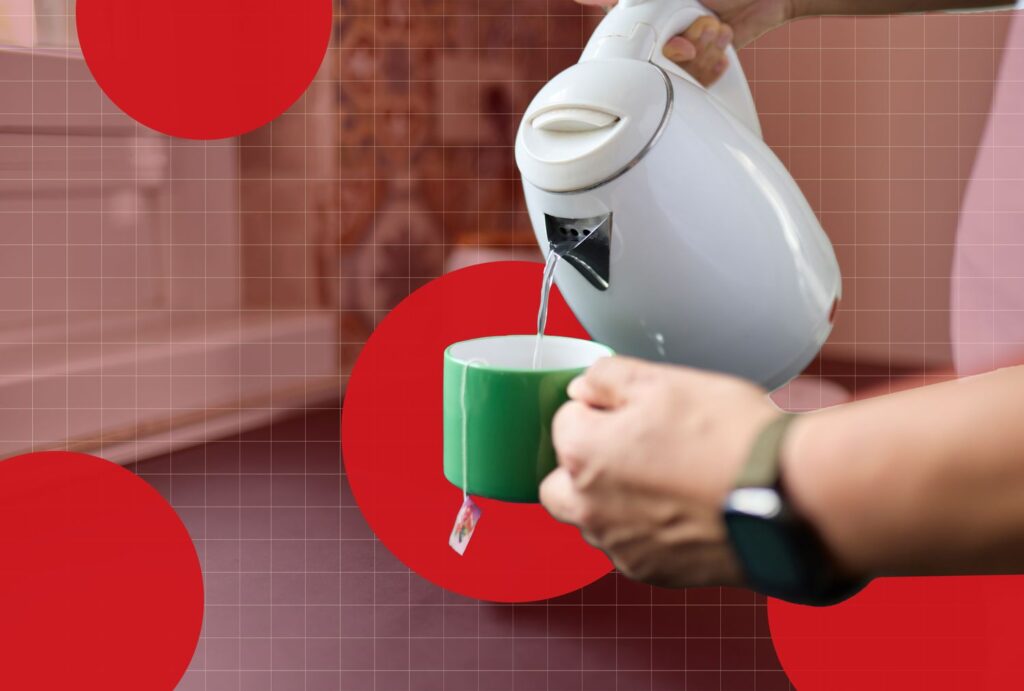- Drinking certain herbal teas before or after surgery may cause dangerous complications.
- Some herbal teas may increase bleeding risk, interact with medications or delay healing.
- If you’re having surgery, speak with your health care provider about any herbal teas you drink.
You may not be thinking about your cup of tea as you go over your pre-op plan with your health care provider. While herbal teas are natural, some can interact with medications and affect blood clotting, blood pressure and post-op healing. Jimmy Sung, M.D., shares, “The main reason we ask patients to stop all herbal supplements, including herbal tea, prior to surgery is to decrease the risk of bleeding and bruising. This is because many herbs have anticoagulant properties.”
That doesn’t mean you have to avoid all herbal teas. But, if you’re having surgery, there are some that should definitely be on your radar. “Most of the time, eating the real food or occasionally drinking a tea made with an herb would not result in a high-enough dose to affect a surgery,” says May Tom, RD. “It’s always better safe than sorry.”
So, which herbal teas might you want to avoid before and after surgery? To find out, we talked to doctors and dietitians. Here’s what they told us.
Ginger Tea
Ginger is known for helping with nausea and immunity. Tom notes, “It is popular during cold and flu season because it boosts the immune system, but it also can increase clotting time, so [it’s] best to avoid [it] for at least a week before surgery.” To date, few studies have actually shown that high doses of ginger slow blood clotting. So, more research is needed to confirm the extent of its effects. In the meantime, be sure to let your health care provider know if you are drinking ginger tea or taking a supplement containing ginger.
Ginkgo Biloba Tea
Ginkgo is a very popular supplement and is also available as a tea. “It can support brain health but should be avoided before and after surgery because of increased risk of bleeding,” says Tom. There are quite a few bioactive compounds in ginkgo, including kaempferol, quercetin, glycosides and ginkgolides. Its ginkgolides have been shown to adversely impact blood clotting and may promote bleeding.
Licorice Tea
Licorice root contains a compound called glycyrrhizin, which can cause irregular heartbeat and cardiac arrest if taken in large amounts. “In theory, licorice tea could raise blood pressure and cause surgery complications,” notes Tom.
Green Tea
Green tea is technically not an herbal tea, but it is a very popular tea and supplement. Reuben Chen, M.D., a physician and herbalist, notes that green tea’s catechins can increase the risk of bleeding. Green tea also interacts with some medications, including osteoporosis and cholesterol-lowering drugs.
Valerian Root Tea
Valerian root tea is commonly taken for sleep, although research on its effectiveness for promoting sleep or treating insomnia is inconclusive. Two of its constituents, valerinic acid and gamma-aminobutyric acid (GABA), may contribute to the sedative effects of the herb. Chen adds to avoid valerian after surgery, as its sedative effects can interact with narcotics. This may lead to excessive drowsiness and respiratory depression.
Chamomile Tea
Chamomile tea is known for having an anticoagulant effect, notes Sung. It contains several bioactive compounds, especially coumarins, which may thin the blood. Right now, it’s unclear how much, if any, is safe. One recent small study found that drinking three cups of strong chamomile tea per day did not impact the time it took blood to clot. But it still makes sense to exercise caution. If you usually drink chamomile tea, check in with your health care professional to see if you should limit it around the time of your surgery.
Turmeric Tea
Turmeric has been used for inflammation, pain and indigestion. Curcumin, perhaps the best-known active compound in turmeric, has anti-inflammatory properties. But it may also have antiplatelet effects. While research is still needed to determine if turmeric can cause post-operative bleeding, it couldn’t hurt to avoid it before and after surgery.
Our Expert Take
Before and after surgery, it’s natural to have a lot on your mind. But don’t forget to tell your health care provider about any herbal teas you usually drink. As innocent as herbal tea may seem, some herbal teas can cause dangerous complications if you drink them before or after surgery. “This revelation frequently arises during preoperative consultations, highlighting a common misconception that natural equates to safe,” says Chen. Herbal teas, like ginger, ginkgo biloba, licorice, valerian root, chamomile and turmeric tea, may lead to complications by interacting with medications or increasing bleeding risk or blood pressure. While it’s technically not an herbal tea, green tea may also act as a blood thinner.
Discussing your herbal intake with your health care team is important, as they can provide specific recommendations based on your health history and current supplement and medication routine. “The key is good communication with your surgeon and following their advice and instructions,” says Sung. Of course, not every surgery is planned in advance. Sung adds, “Herbal tea is not an absolute contraindication. If the surgery is urgent and necessary, it should proceed as long as the benefits outweigh the risks.”

